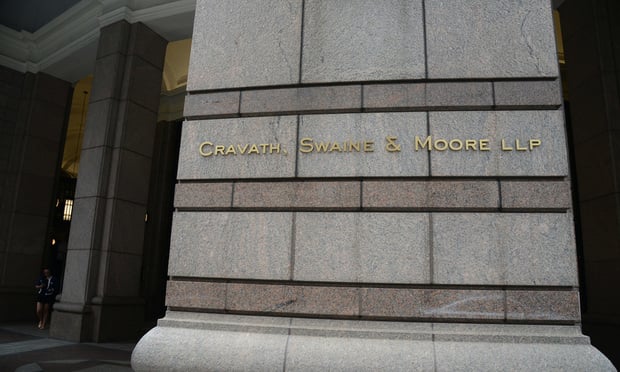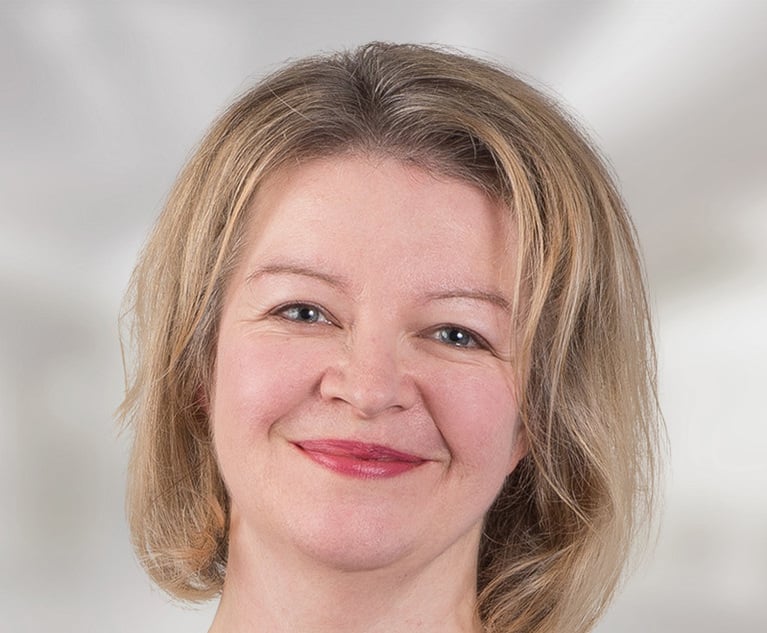Cravath loses another senior partner to Kirkland as pressure on firm's lockstep model grows
Former litigation head becomes latest partner to leave Wall Street firm amid growing scrutiny on compensation
April 14, 2018 at 02:16 PM
5 minute read
The original version of this story was published on The American Lawyer

Four months after making headlines with its hire of Cravath Swaine & Moore corporate partner Eric Schiele, Kirkland & Ellis has returned to the firm for two more hires.
Sandra Goldstein, long considered one of Cravath's most powerful partners and a former head of litigation at the firm, is moving to Kirkland's New York office with litigation associate Stefan Atkinson, according to a source briefed on the matter.
She has resigned from Cravath's partnership, and all inquiries on client matters are being directed to Daniel Slifkin, the current head of Cravath's litigation group. A request for comment sent to Goldstein at Kirkland and her personal email address were not immediately returned by the time of this story.
Goldstein's move to Kirkland, which was first reported by Reuters and The Wall Street Journal, comes as Cravath and other traditionally-lockstep New York firms grapple with challenges to their compensation model from outfits like Kirkland, which have extended lucrative pay packages to recruit high-end laterals.
Kirkland, which last year moved ahead of Latham & Watkins to become the world's highest-grossing law firm with $3.165bn in revenue, has previously tapped Cravath for new talent. In late 2016, Kirkland hired Cravath M&A partner Jonathan Davis in New York, a move that came four years after former Cravath M&A partner Sarkis Jebejian jumped to Kirkland.
Schiele, who worked alongside Cravath's presiding partner Faiza Saeed on some of the firm's largest deals, including Disney's pending $66bn purchase of 21st Century Fox, made the move to Kirkland in January. In early 2016, Cravath saw M&A superstar Scott Barshay leave its ranks for Paul, Weiss Rifkind Wharton & Garrison, which agreed to pay him nearly $10m per year, according to reporting by The American Lawyer.
The partner exits have put pressure on Cravath's lockstep model. The firm, which will celebrate its 200th anniversary next year, has made tweaks to the timeline of its partnership compensation structure. But Cravath has also resisted incorporating major changes that some of its contemporaries, such as Simpson Thacher & Bartlett, have made to their own lockstep compensation systems.
In a statement provided in March to the New York Law Journal, Cravath defended its system as encompassing "our approach to talent development, client service and compensation", adding: "It is the foundation of our collaborative culture, and it drives the consistency in quality across our platform that enables us to deliver the best advice to our clients in their most challenging matters."
Saeed, a top Cravath dealmaker who in 2016 became the firm's first female leader after succeeding Allen Parker as presiding partner, did not return a request for comment about Goldstein's departure. Kirkland declined to discuss the matter.
Goldstein, who specialises in litigation related to M&A deals, often worked closely with Saeed, who handles the corporate side of such transactions. Goldstein headed Cravath's litigation group from 2010 until 2016, when Slifkin assumed leadership of the practice.
As for Kirkland, Goldstein and Atkinson are the latest additions in what has been a robust few months of lateral partner recruitment by the firm, which in December absorbed a high-profile investment management team from Debevoise & Plimpton.
Kirkland recently brought on a pair of energy, infrastructure and project finance partners from Norton Rose Fulbright in Washington DC, while other recent notable recruits include its Latham's former private equity co-head Jennifer Perkins in New York.
In London, Kirkland agreed a $10m a year deal to bring on Freshfields Bruckhaus Deringer private equity partner David Higgins late last year as its new local co-managing partner.
It was not immediately clear how much Kirkland has agreed to pay Goldstein, who is likely to have been at the high end of Cravath's partnership compensation scheme. Profits per partner (PEP) at the all-equity firm were roughly $4m last year, according to ALM Intelligence data. At Kirkland, which unlike Cravath has a large non-equity partnership tier, PEP averaged $4.7m in 2017.
In late 2016, Kirkland shook up its own compensation framework by slashing the equity stakes of some partners, including many senior litigators. The firm has previously paid big money to recruit star laterals, including former Winston & Strawn litigation chair James Hurst, who reportedly received a $9m guarantee to make the move to Kirkland's Chicago headquarters in late 2014.
For more, see:
NOT FOR REPRINT
© 2025 ALM Global, LLC, All Rights Reserved. Request academic re-use from www.copyright.com. All other uses, submit a request to [email protected]. For more information visit Asset & Logo Licensing.
You Might Like
View All
Australian Class Action to be Launched Against Google Over Display Advertising
4 minute read

Trump Ordered to Pay Legal Bill Within 28 Days After Rejecting Costs Order
2 minute readTrending Stories
- 128 Firms Supporting Retired Barnes & Thornburg Litigator in Georgia Supreme Court Malpractice Case
- 2Boosting Litigation and Employee Benefits Practices, Two Am Law 100 Firms Grow in Pittsburgh
- 3EMT Qualifies as 'Health Care Provider' Under Whistleblower Act, State Appellate Court Rules
- 4Bar Report - Feb. 3
- 5Was $1.3M in 'Incentive' Payments Commission? NJ Justices Weigh Arguments
Who Got The Work
J. Brugh Lower of Gibbons has entered an appearance for industrial equipment supplier Devco Corporation in a pending trademark infringement lawsuit. The suit, accusing the defendant of selling knock-off Graco products, was filed Dec. 18 in New Jersey District Court by Rivkin Radler on behalf of Graco Inc. and Graco Minnesota. The case, assigned to U.S. District Judge Zahid N. Quraishi, is 3:24-cv-11294, Graco Inc. et al v. Devco Corporation.
Who Got The Work
Rebecca Maller-Stein and Kent A. Yalowitz of Arnold & Porter Kaye Scholer have entered their appearances for Hanaco Venture Capital and its executives, Lior Prosor and David Frankel, in a pending securities lawsuit. The action, filed on Dec. 24 in New York Southern District Court by Zell, Aron & Co. on behalf of Goldeneye Advisors, accuses the defendants of negligently and fraudulently managing the plaintiff's $1 million investment. The case, assigned to U.S. District Judge Vernon S. Broderick, is 1:24-cv-09918, Goldeneye Advisors, LLC v. Hanaco Venture Capital, Ltd. et al.
Who Got The Work
Attorneys from A&O Shearman has stepped in as defense counsel for Toronto-Dominion Bank and other defendants in a pending securities class action. The suit, filed Dec. 11 in New York Southern District Court by Bleichmar Fonti & Auld, accuses the defendants of concealing the bank's 'pervasive' deficiencies in regards to its compliance with the Bank Secrecy Act and the quality of its anti-money laundering controls. The case, assigned to U.S. District Judge Arun Subramanian, is 1:24-cv-09445, Gonzalez v. The Toronto-Dominion Bank et al.
Who Got The Work
Crown Castle International, a Pennsylvania company providing shared communications infrastructure, has turned to Luke D. Wolf of Gordon Rees Scully Mansukhani to fend off a pending breach-of-contract lawsuit. The court action, filed Nov. 25 in Michigan Eastern District Court by Hooper Hathaway PC on behalf of The Town Residences LLC, accuses Crown Castle of failing to transfer approximately $30,000 in utility payments from T-Mobile in breach of a roof-top lease and assignment agreement. The case, assigned to U.S. District Judge Susan K. Declercq, is 2:24-cv-13131, The Town Residences LLC v. T-Mobile US, Inc. et al.
Who Got The Work
Wilfred P. Coronato and Daniel M. Schwartz of McCarter & English have stepped in as defense counsel to Electrolux Home Products Inc. in a pending product liability lawsuit. The court action, filed Nov. 26 in New York Eastern District Court by Poulos Lopiccolo PC and Nagel Rice LLP on behalf of David Stern, alleges that the defendant's refrigerators’ drawers and shelving repeatedly break and fall apart within months after purchase. The case, assigned to U.S. District Judge Joan M. Azrack, is 2:24-cv-08204, Stern v. Electrolux Home Products, Inc.
Featured Firms
Law Offices of Gary Martin Hays & Associates, P.C.
(470) 294-1674
Law Offices of Mark E. Salomone
(857) 444-6468
Smith & Hassler
(713) 739-1250









